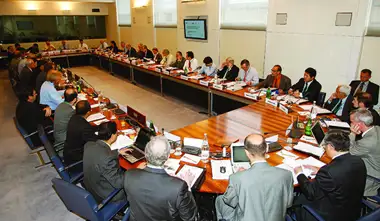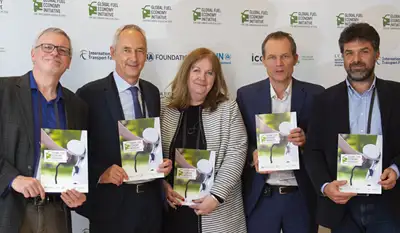
About
GFEI is a global partnership of expert groups working together for 15 years, to support the global vehicle fleet transformation we need to address these negative impacts.

GFEI undertakes research, global advocacy, and capacity-building. The initiative has a focus on developed and developing markets. The Initiative works across all energy types, including internal combustion engines, hybrids engines, and electric vehicles.
GFEI Targets
Passenger light-duty vehicle targets
Double global fuel economy of new vehicles by 2030, reduce CO2 emissions by 90% by 2050

Heavy-duty vehicle targets
Improve new vehicle fuel consumption 35% by 2035 - CO2 reduction target of 70% by 2050

Transit bus targets
Improve fuel economy to reduce CO2 emissions by 65% by 2035 and 95% by 2050

Two & three wheel vehicle targets
Improve fuel economy to reduce CO2 emissions by 80% by 2035 and 95% by 2050

Decarbonising road transport to tackle climate change
A new fleetwide CO2 reduction target of 65% by 2050 compared with 2005. To comply with the Paris Agreement’s less than 2 degree scenario, better fuel efficiency of conventional vehicle technologies; a faster transition to electric vehicles; a faster decarbonisation of the electricity grid; and additional ‘avoid’ and ‘shift’ measures eg more non-motorised mobility, are all needed


HISTORY
The Global Fuel Economy Initiative (GFEI) was established in 2009 to assist policy-makers in promoting greater fuel economy at national, regional, and global levels.
GFEI began by working on strong evidence; developing country baselines and policy options; and bringing the issue of vehicle efficiency to the attention of global policy processes.
It has been involved in the shaping of the United Nations Sustainable Development Goals, the work of Sustainable Energy for All and Sustainable Mobility for All, as well as the G20 and United Nations climate change processes.

GOVERNANCE
The GFEI is a partnership of leading energy and environmental organisations, conducting and sharing research to support transport climate action.
The partners of GFEI are IEA, UNEP, ITF, ICCT, UC Davis, and the FIA Foundation.

SECRETARIAT
The FIA Foundation is the secretariat and primary funder of the GFEI.





